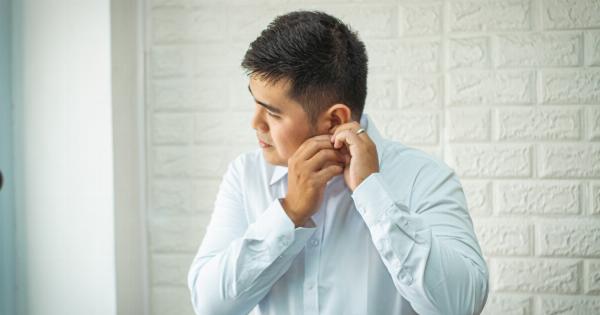Ear labyrinthitis is a condition that causes inflammation of the inner ear. It can affect one or both ears and can lead to symptoms such as dizziness, vertigo, and ringing in the ears.
Ear labyrinthitis can be caused by a variety of factors, including infections, allergies, and head injuries. In this article, we discuss the causes and symptoms of ear labyrinthitis in more detail.
Causes of Ear Labyrinthitis
Ear labyrinthitis can be caused by a number of different factors. Some of the most common causes are:.
Infections
Infections are one of the most common causes of ear labyrinthitis. Infections can be caused by bacteria or viruses and can affect either the inner ear or the nerve that connects the inner ear to the brain.
Common infections that can cause ear labyrinthitis include:.
- Viral infections, such as the flu or common cold
- Bacterial infections, such as strep throat or pneumonia
- Otitis media, an infection of the middle ear
Head Injuries
Head injuries can also cause ear labyrinthitis. Injuries that can lead to inner ear damage include:.
- Concussions
- Skull fractures
- Whiplash
Allergies
Allergies can also cause ear labyrinthitis. Allergies can cause inflammation of the inner ear, which can lead to symptoms such as dizziness and vertigo. Common allergens that can cause ear labyrinthitis include:.
- Pollen
- Dust mites
- Pet dander
- Mold
Symptoms of Ear Labyrinthitis
The symptoms of ear labyrinthitis can vary from person to person. Some of the most common symptoms include:.
Dizziness
Dizziness is one of the most common symptoms of ear labyrinthitis. Dizziness can range from mild to severe and can be accompanied by a feeling of disorientation or loss of balance. In some cases, dizziness can also lead to nausea and vomiting.
Vertigo
Vertigo is a specific type of dizziness that is characterized by a spinning or whirling sensation. Vertigo can be triggered by specific movements, such as getting out of bed or turning your head quickly.
Vertigo can be accompanied by symptoms such as sweating, nausea, and vomiting.
Ringing in the Ears
Ringing in the ears, also known as tinnitus, is another common symptom of ear labyrinthitis. Tinnitus can range from a mild ringing sensation to a loud, persistent ringing or buzzing.
Tinnitus can be accompanied by symptoms such as headaches, dizziness, and vertigo.
Hearing Loss
Hearing loss is another possible symptom of ear labyrinthitis. Hearing loss can range from a mild decrease in hearing to a complete loss of hearing in one or both ears.
Hearing loss can be temporary or permanent depending on the cause of the labyrinthitis.
Treatment for Ear Labyrinthitis
The treatment for ear labyrinthitis depends on the underlying cause of the condition. In some cases, the symptoms of ear labyrinthitis will go away on their own without any treatment.
In other cases, treatment may be required to alleviate symptoms and address the underlying cause of the condition.
Medications
Medications can be used to treat ear labyrinthitis. Medications that can be used include:.
- Antibiotics, if the labyrinthitis is caused by a bacterial infection
- Antihistamines, if the labyrinthitis is caused by allergies
- Steroids, to reduce inflammation in the inner ear
- Anti-nausea medications, such as meclizine, to alleviate dizziness and vertigo
Vestibular Rehabilitation Therapy
Vestibular rehabilitation therapy is a type of physical therapy that can be used to treat ear labyrinthitis. The goal of vestibular rehabilitation therapy is to train the brain to compensate for any balance problems caused by the inner ear inflammation.
Vestibular rehabilitation therapy can be especially helpful for patients who experience long-term symptoms of dizziness or vertigo.
Surgery
In rare cases, surgery may be required to treat ear labyrinthitis. Surgery may be necessary if the labyrinthitis is caused by a tumor, such as an acoustic neuroma, or if other treatments have been ineffective in alleviating symptoms.
Preventing Ear Labyrinthitis
There are certain precautions you can take to reduce your risk of developing ear labyrinthitis. Some tips to prevent ear labyrinthitis include:.
- Avoiding exposure to loud noises for extended periods of time
- Wearing earplugs or earmuffs when exposed to loud noises
- Getting regular check-ups with your doctor to monitor for any ear infections or other conditions that may lead to labyrinthitis
- Avoiding head injuries, such as wearing a helmet when participating in high-risk activities
- Managing any underlying conditions, such as allergies or asthma, that may increase your risk of developing labyrinthitis
Conclusion
Ear labyrinthitis is a condition that can cause a variety of symptoms, including dizziness, vertigo, and ringing in the ears. Ear labyrinthitis can be caused by infections, head injuries, and allergies.
Treatment for ear labyrinthitis depends on the underlying cause of the condition and can include medications, vestibular rehabilitation therapy, and surgery in rare cases.
By taking certain precautions, such as avoiding exposure to loud noises and getting regular check-ups with your doctor, you can reduce your risk of developing ear labyrinthitis.




























